High-Quality Care, Focused on You
Our team of top cardiologists is committed to leading the way to healthy outcomes. Because your heart deserves nothing less.

Dedicated to improving outcomes in heart care
From diagnosis to post-treatment, the cardiac care team at Kaiser Permanente is helping lead the way in heart care. Since 2009, our Heart and Vascular Care team at Kaiser Permanente Sunnyside Medical Center has received the Society of Thoracic Surgeons’ (STS) highest rating each year, based on performance data for cardiac surgery.1 For general thoracic surgery, we are 1 of only 7 hospitals in the country to earn the highest distinction.2
Our skilled teams work together to provide a high level of integrated care, performing leading-edge procedures to replace heart valves, close holes in the heart, remove blockages, open arteries, and more. We are the only hospital in Oregon to get the highest STS rating for isolated coronary artery bypass grafting (CABG)3 and isolated aortic valve replacement (AVR).4
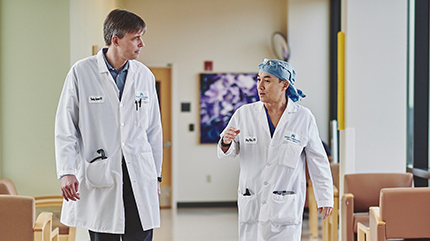
Where a heart surgeon turns for heart surgery
Both patients and doctors alike turn to Kaiser Permanente because of our reputation as a cardiac care leader. In addition to recruiting cardiologists from around the world, we are also sought out by them. Our highly trained group of cardiologists was recently recognized in Portland Monthly magazine’s “Portland’s Top Doctors 2019” issue.5 Of the 26 Top Docs honored in cardiology and cardiothoracic surgery, 9 are with Kaiser Permanente — more than any other group in those categories. With numbers like these, our members have come to expect high-quality care every time.

Confidence every step of the way
Throughout the care experience, our cardiac team encourages members to focus on prevention. To that end, 70% of our members keep their high blood pressure under control compared with the national average of 54%.6
When problems arise, the Kaiser Permanente system is designed to help catch and treat things early. According to the National Cardiovascular Data Registry, our survival rate for left ventricular assist device (LVAD) implants is 100% after one year — 20 points higher than the national average of 80%.7
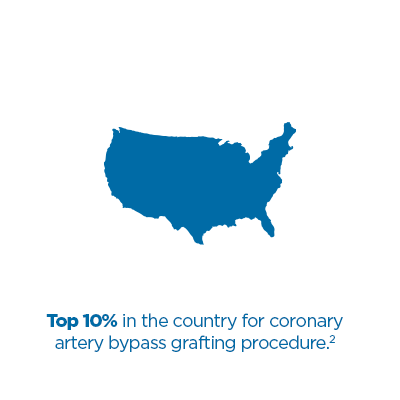
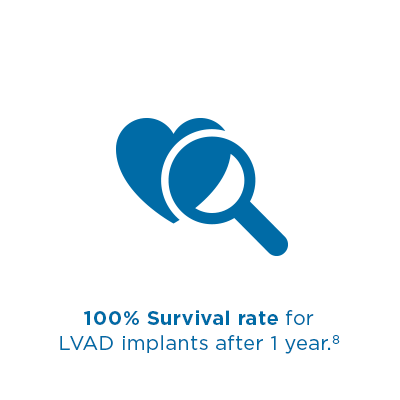
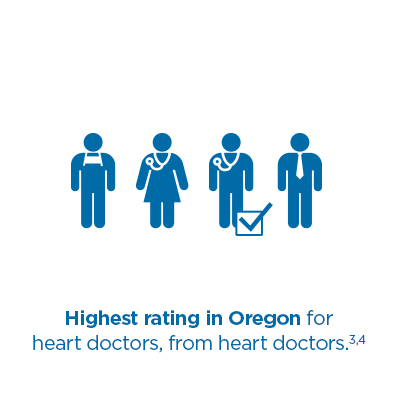
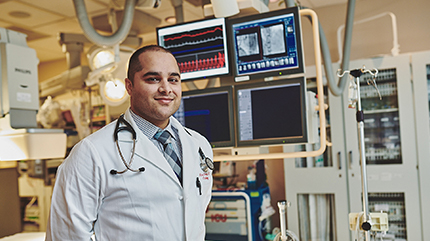
Advancing care through technology
Kaiser Permanente combines cardiology with technology, using minimally invasive, industry-leading procedures. One such procedure, dubbed the Watchman, is performed by cardiologist Abhimanyu Uberoi, MD, and involves inserting in the heart a tiny umbrella-shaped device that blocks the left atrial appendage so blood can’t pool there. New techniques such as this help enable patients to return home sooner, oftentimes the next day.
Dr. Uberoi believes in preventive medicine, but he also believes in second chances. “When prevention fails, we have to be practical,” he said. “When I go home at night, I can literally say I saved people’s lives.”

The power of integration
All the care providers on your team, including your personal doctor, radiologist, cardiologist, nurses, and pharmacists, are connected to your electronic health record. They’re informed and ready to give you the care you need when you need it. When it comes to cardiac care, time is of the essence.
This level of integration allows us to better track members with higher risk of heart disease, provide automated screening reminders, and arrange referrals and tests with Kaiser Permanente specialists. All connected to each other, and all connected to you.

Getting better, faster
Ultimately, cardiac care is about getting patients back to the lives they want to lead. Our comprehensive, integrated approach to care helps enable those healthy outcomes in ways that are safe and speedy.
Our cardiac team employs the latest innovations for minimally invasive procedures that can have patients back on their feet promptly — oftentimes the same day. As pleasant as our staff and facilities are, we find that patients are eager to get back to enjoying their lives.

Yong Shin, MD Chief of Cardiothoracic Surgery
Reference
Reference
- The Society of Thoracic Surgeons’ comprehensive rating system allows for comparisons regarding the quality of cardiac surgery among hospitals across the country. Approximately [10%] of hospitals receive the “3 star” rating, which denotes the highest category of quality. Rating based on an analysis of national data covering the period from June 2010 through June 2016. Last accessed August 10, 2017, http://www.sts.org/quality-research-patient-safety/sts-public-reporting-online.
- http://publicreporting.sts.org/gtsd?title=&field_state_value=All&order=field_overall_composite_score&sort=desc
- http://publicreporting.sts.org/search/cabg_report_card/hospital?title=&field_year_target_id=11&field_state_value=OR&order=field_star_overall_op_mortality&sort=desc
- http://publicreporting.sts.org/search/avr_report_card/hospital?title=&field_state_value=OR&field_year_target_id=All&order=field_star_overall_op_mortality&sort=desc
- Ramona DeNies, “Portland’s Top Doctors 2018,” Portland Monthly, December 28, 2017, pdxmonthly.com/articles/2017/12/28/portland-s-top-doctors-nurses-2018.
- Kaiser Permanente program average is the weighted average of each regional health plans rate and its eligible Commercial plan and Medicare plan population. National average is based on Controlling High Blood Pressure 2016 ratings from the Healthcare Effectiveness Data and Information Set (HEDIS) for commercial and Medicare plans published by the National Committee for Quality Assurance. Kaiser Permanente 2016 HEDIS® scores. Benchmarks provided by the National Committee for Quality Assurance (NCQA) Quality Compass® and represent all lines of business. Kaiser Permanente combined region scores were provided by the Kaiser Permanente Department of Care and Service Quality. The source for data contained in this publication is Quality Compass 2016 and is used with the permission of NCQA. Quality Compass 2016 includes certain CAHPS® data. Any data display, analysis, interpretation, or conclusion based on these data is solely that of the authors, and NCQA specifically disclaims responsibility for any such display, analysis, interpretation, or conclusion. Quality Compass® and HEDIS® are registered trademarks of NCQA. CAHPS® is a registered trademark of the Agency for Healthcare Research and Quality. For more information, visit ncqa.org.
- uab.edu/medicine/intermacs

